The Role of Adult Learning in Motivating Young Adults to Citizenship
VerifiedAdded on 2023/06/10
|6
|1742
|352
Essay
AI Summary
This essay examines the significant role of adult learning in motivating young adults from vulnerable groups to become active citizens, drawing on international perspectives. It emphasizes how lifelong learning, as promoted by UNESCO and the Council of Europe, transforms society into a learning resource for individuals. The essay highlights the importance of including young adults in adult learning programs to foster social cohesion and inclusion in modern democratic societies. It addresses the development of social and economic skills through lifelong learning and the challenges faced by young adults due to unstable political, social, and economic situations. The discussion concludes that fostering active participatory citizenship through adult learning programs is crucial for social inclusion and justice, and it underscores the complexity of translating these concepts into effective learning programs.
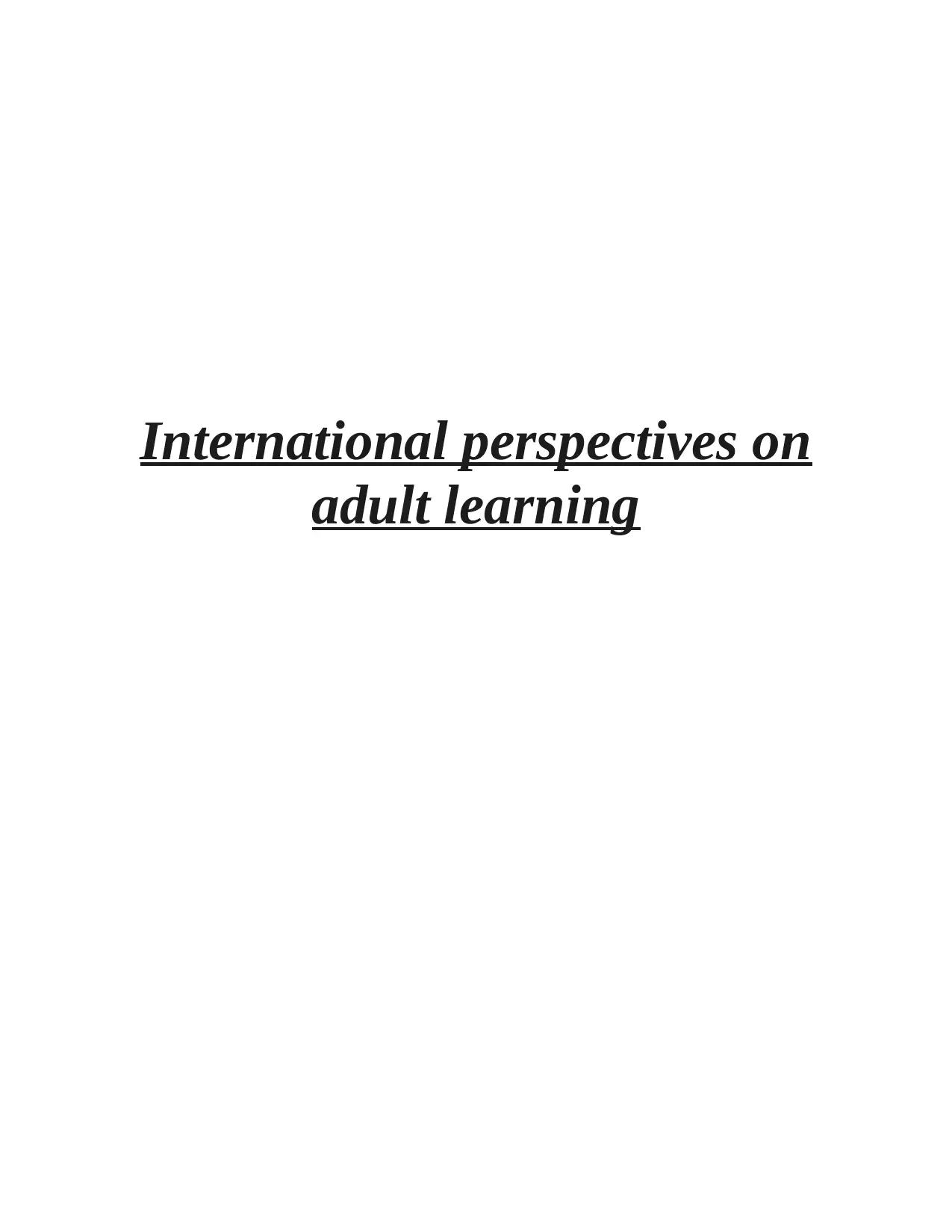
International perspectives on
adult learning
adult learning
Paraphrase This Document
Need a fresh take? Get an instant paraphrase of this document with our AI Paraphraser
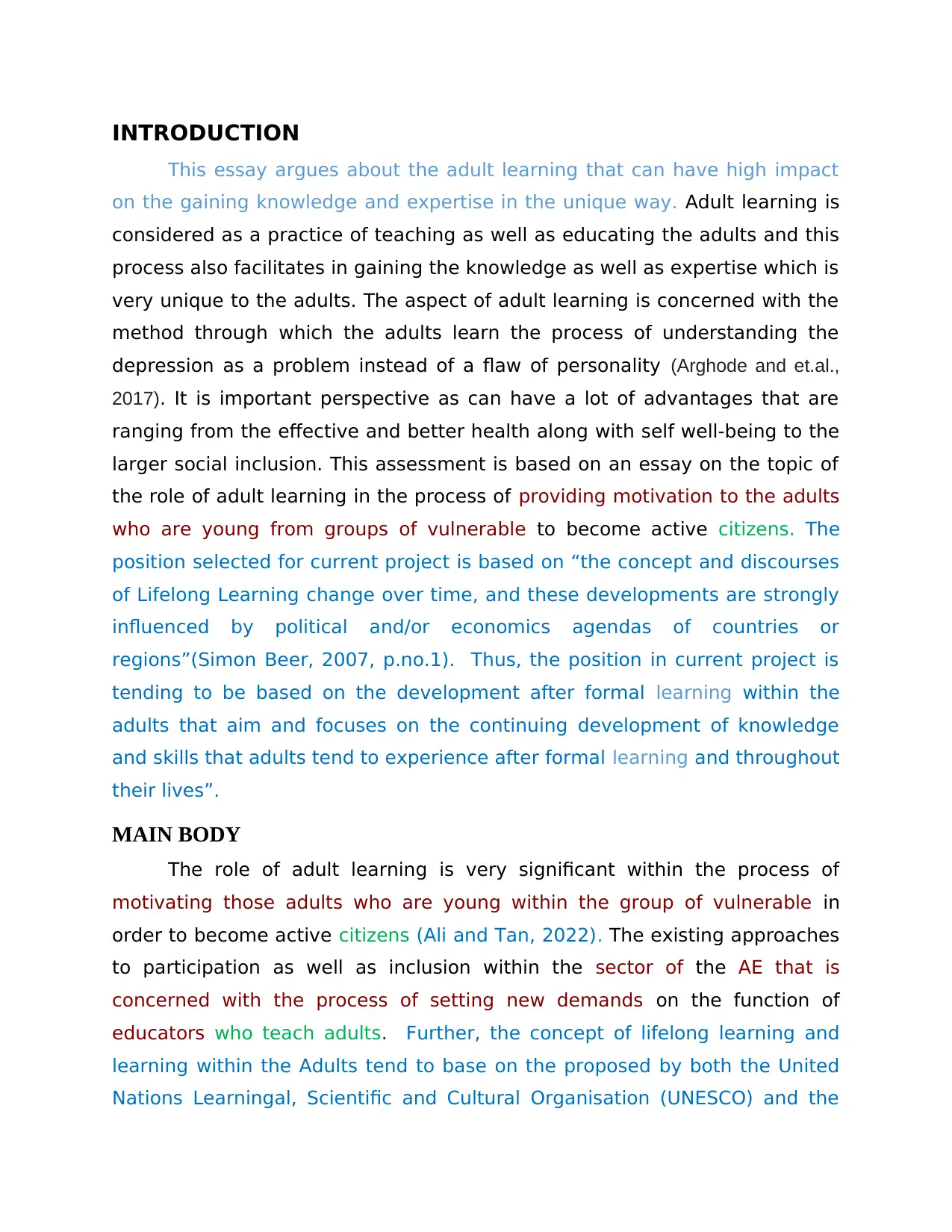
INTRODUCTION
This essay argues about the adult learning that can have high impact
on the gaining knowledge and expertise in the unique way. Adult learning is
considered as a practice of teaching as well as educating the adults and this
process also facilitates in gaining the knowledge as well as expertise which is
very unique to the adults. The aspect of adult learning is concerned with the
method through which the adults learn the process of understanding the
depression as a problem instead of a flaw of personality (Arghode and et.al.,
2017). It is important perspective as can have a lot of advantages that are
ranging from the effective and better health along with self well-being to the
larger social inclusion. This assessment is based on an essay on the topic of
the role of adult learning in the process of providing motivation to the adults
who are young from groups of vulnerable to become active citizens. The
position selected for current project is based on “the concept and discourses
of Lifelong Learning change over time, and these developments are strongly
influenced by political and/or economics agendas of countries or
regions”(Simon Beer, 2007, p.no.1). Thus, the position in current project is
tending to be based on the development after formal learning within the
adults that aim and focuses on the continuing development of knowledge
and skills that adults tend to experience after formal learning and throughout
their lives”.
MAIN BODY
The role of adult learning is very significant within the process of
motivating those adults who are young within the group of vulnerable in
order to become active citizens (Ali and Tan, 2022). The existing approaches
to participation as well as inclusion within the sector of the AE that is
concerned with the process of setting new demands on the function of
educators who teach adults. Further, the concept of lifelong learning and
learning within the Adults tend to base on the proposed by both the United
Nations Learningal, Scientific and Cultural Organisation (UNESCO) and the
This essay argues about the adult learning that can have high impact
on the gaining knowledge and expertise in the unique way. Adult learning is
considered as a practice of teaching as well as educating the adults and this
process also facilitates in gaining the knowledge as well as expertise which is
very unique to the adults. The aspect of adult learning is concerned with the
method through which the adults learn the process of understanding the
depression as a problem instead of a flaw of personality (Arghode and et.al.,
2017). It is important perspective as can have a lot of advantages that are
ranging from the effective and better health along with self well-being to the
larger social inclusion. This assessment is based on an essay on the topic of
the role of adult learning in the process of providing motivation to the adults
who are young from groups of vulnerable to become active citizens. The
position selected for current project is based on “the concept and discourses
of Lifelong Learning change over time, and these developments are strongly
influenced by political and/or economics agendas of countries or
regions”(Simon Beer, 2007, p.no.1). Thus, the position in current project is
tending to be based on the development after formal learning within the
adults that aim and focuses on the continuing development of knowledge
and skills that adults tend to experience after formal learning and throughout
their lives”.
MAIN BODY
The role of adult learning is very significant within the process of
motivating those adults who are young within the group of vulnerable in
order to become active citizens (Ali and Tan, 2022). The existing approaches
to participation as well as inclusion within the sector of the AE that is
concerned with the process of setting new demands on the function of
educators who teach adults. Further, the concept of lifelong learning and
learning within the Adults tend to base on the proposed by both the United
Nations Learningal, Scientific and Cultural Organisation (UNESCO) and the
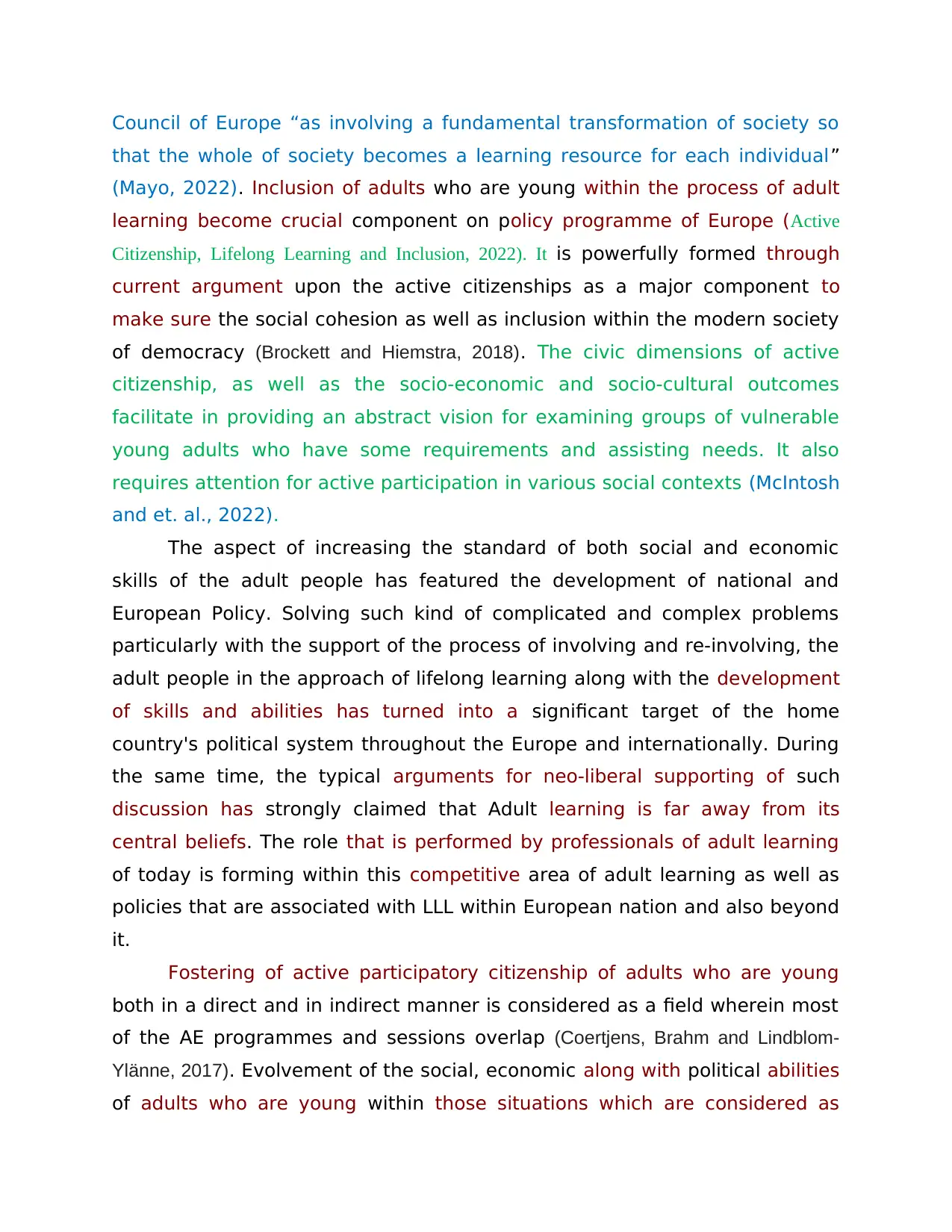
Council of Europe “as involving a fundamental transformation of society so
that the whole of society becomes a learning resource for each individual”
(Mayo, 2022). Inclusion of adults who are young within the process of adult
learning become crucial component on policy programme of Europe (Active
Citizenship, Lifelong Learning and Inclusion, 2022). It is powerfully formed through
current argument upon the active citizenships as a major component to
make sure the social cohesion as well as inclusion within the modern society
of democracy (Brockett and Hiemstra, 2018). The civic dimensions of active
citizenship, as well as the socio-economic and socio-cultural outcomes
facilitate in providing an abstract vision for examining groups of vulnerable
young adults who have some requirements and assisting needs. It also
requires attention for active participation in various social contexts (McIntosh
and et. al., 2022).
The aspect of increasing the standard of both social and economic
skills of the adult people has featured the development of national and
European Policy. Solving such kind of complicated and complex problems
particularly with the support of the process of involving and re-involving, the
adult people in the approach of lifelong learning along with the development
of skills and abilities has turned into a significant target of the home
country's political system throughout the Europe and internationally. During
the same time, the typical arguments for neo-liberal supporting of such
discussion has strongly claimed that Adult learning is far away from its
central beliefs. The role that is performed by professionals of adult learning
of today is forming within this competitive area of adult learning as well as
policies that are associated with LLL within European nation and also beyond
it.
Fostering of active participatory citizenship of adults who are young
both in a direct and in indirect manner is considered as a field wherein most
of the AE programmes and sessions overlap (Coertjens, Brahm and Lindblom-
Ylänne, 2017). Evolvement of the social, economic along with political abilities
of adults who are young within those situations which are considered as
that the whole of society becomes a learning resource for each individual”
(Mayo, 2022). Inclusion of adults who are young within the process of adult
learning become crucial component on policy programme of Europe (Active
Citizenship, Lifelong Learning and Inclusion, 2022). It is powerfully formed through
current argument upon the active citizenships as a major component to
make sure the social cohesion as well as inclusion within the modern society
of democracy (Brockett and Hiemstra, 2018). The civic dimensions of active
citizenship, as well as the socio-economic and socio-cultural outcomes
facilitate in providing an abstract vision for examining groups of vulnerable
young adults who have some requirements and assisting needs. It also
requires attention for active participation in various social contexts (McIntosh
and et. al., 2022).
The aspect of increasing the standard of both social and economic
skills of the adult people has featured the development of national and
European Policy. Solving such kind of complicated and complex problems
particularly with the support of the process of involving and re-involving, the
adult people in the approach of lifelong learning along with the development
of skills and abilities has turned into a significant target of the home
country's political system throughout the Europe and internationally. During
the same time, the typical arguments for neo-liberal supporting of such
discussion has strongly claimed that Adult learning is far away from its
central beliefs. The role that is performed by professionals of adult learning
of today is forming within this competitive area of adult learning as well as
policies that are associated with LLL within European nation and also beyond
it.
Fostering of active participatory citizenship of adults who are young
both in a direct and in indirect manner is considered as a field wherein most
of the AE programmes and sessions overlap (Coertjens, Brahm and Lindblom-
Ylänne, 2017). Evolvement of the social, economic along with political abilities
of adults who are young within those situations which are considered as
⊘ This is a preview!⊘
Do you want full access?
Subscribe today to unlock all pages.

Trusted by 1+ million students worldwide
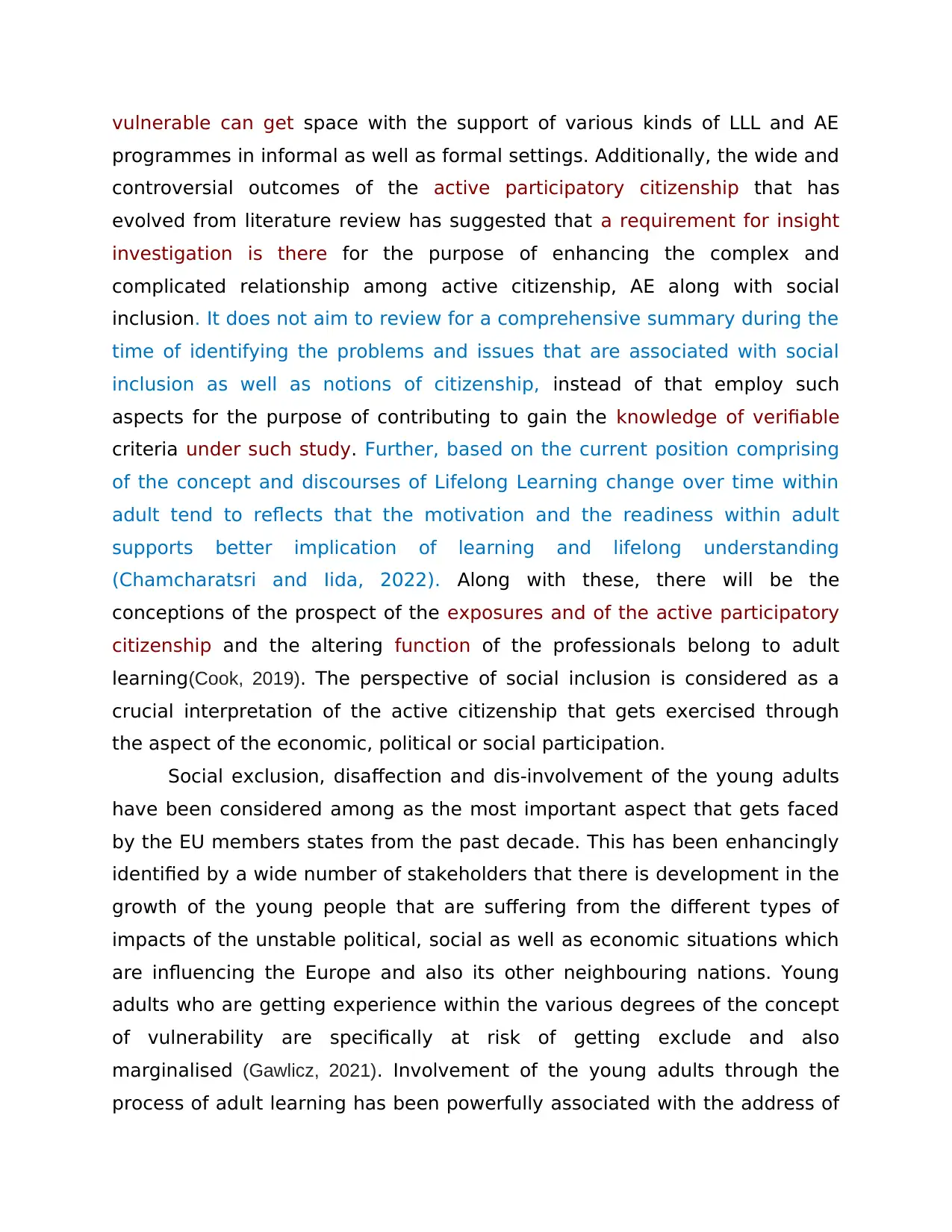
vulnerable can get space with the support of various kinds of LLL and AE
programmes in informal as well as formal settings. Additionally, the wide and
controversial outcomes of the active participatory citizenship that has
evolved from literature review has suggested that a requirement for insight
investigation is there for the purpose of enhancing the complex and
complicated relationship among active citizenship, AE along with social
inclusion. It does not aim to review for a comprehensive summary during the
time of identifying the problems and issues that are associated with social
inclusion as well as notions of citizenship, instead of that employ such
aspects for the purpose of contributing to gain the knowledge of verifiable
criteria under such study. Further, based on the current position comprising
of the concept and discourses of Lifelong Learning change over time within
adult tend to reflects that the motivation and the readiness within adult
supports better implication of learning and lifelong understanding
(Chamcharatsri and Iida, 2022). Along with these, there will be the
conceptions of the prospect of the exposures and of the active participatory
citizenship and the altering function of the professionals belong to adult
learning(Cook, 2019). The perspective of social inclusion is considered as a
crucial interpretation of the active citizenship that gets exercised through
the aspect of the economic, political or social participation.
Social exclusion, disaffection and dis-involvement of the young adults
have been considered among as the most important aspect that gets faced
by the EU members states from the past decade. This has been enhancingly
identified by a wide number of stakeholders that there is development in the
growth of the young people that are suffering from the different types of
impacts of the unstable political, social as well as economic situations which
are influencing the Europe and also its other neighbouring nations. Young
adults who are getting experience within the various degrees of the concept
of vulnerability are specifically at risk of getting exclude and also
marginalised (Gawlicz, 2021). Involvement of the young adults through the
process of adult learning has been powerfully associated with the address of
programmes in informal as well as formal settings. Additionally, the wide and
controversial outcomes of the active participatory citizenship that has
evolved from literature review has suggested that a requirement for insight
investigation is there for the purpose of enhancing the complex and
complicated relationship among active citizenship, AE along with social
inclusion. It does not aim to review for a comprehensive summary during the
time of identifying the problems and issues that are associated with social
inclusion as well as notions of citizenship, instead of that employ such
aspects for the purpose of contributing to gain the knowledge of verifiable
criteria under such study. Further, based on the current position comprising
of the concept and discourses of Lifelong Learning change over time within
adult tend to reflects that the motivation and the readiness within adult
supports better implication of learning and lifelong understanding
(Chamcharatsri and Iida, 2022). Along with these, there will be the
conceptions of the prospect of the exposures and of the active participatory
citizenship and the altering function of the professionals belong to adult
learning(Cook, 2019). The perspective of social inclusion is considered as a
crucial interpretation of the active citizenship that gets exercised through
the aspect of the economic, political or social participation.
Social exclusion, disaffection and dis-involvement of the young adults
have been considered among as the most important aspect that gets faced
by the EU members states from the past decade. This has been enhancingly
identified by a wide number of stakeholders that there is development in the
growth of the young people that are suffering from the different types of
impacts of the unstable political, social as well as economic situations which
are influencing the Europe and also its other neighbouring nations. Young
adults who are getting experience within the various degrees of the concept
of vulnerability are specifically at risk of getting exclude and also
marginalised (Gawlicz, 2021). Involvement of the young adults through the
process of adult learning has been powerfully associated with the address of
Paraphrase This Document
Need a fresh take? Get an instant paraphrase of this document with our AI Paraphraser
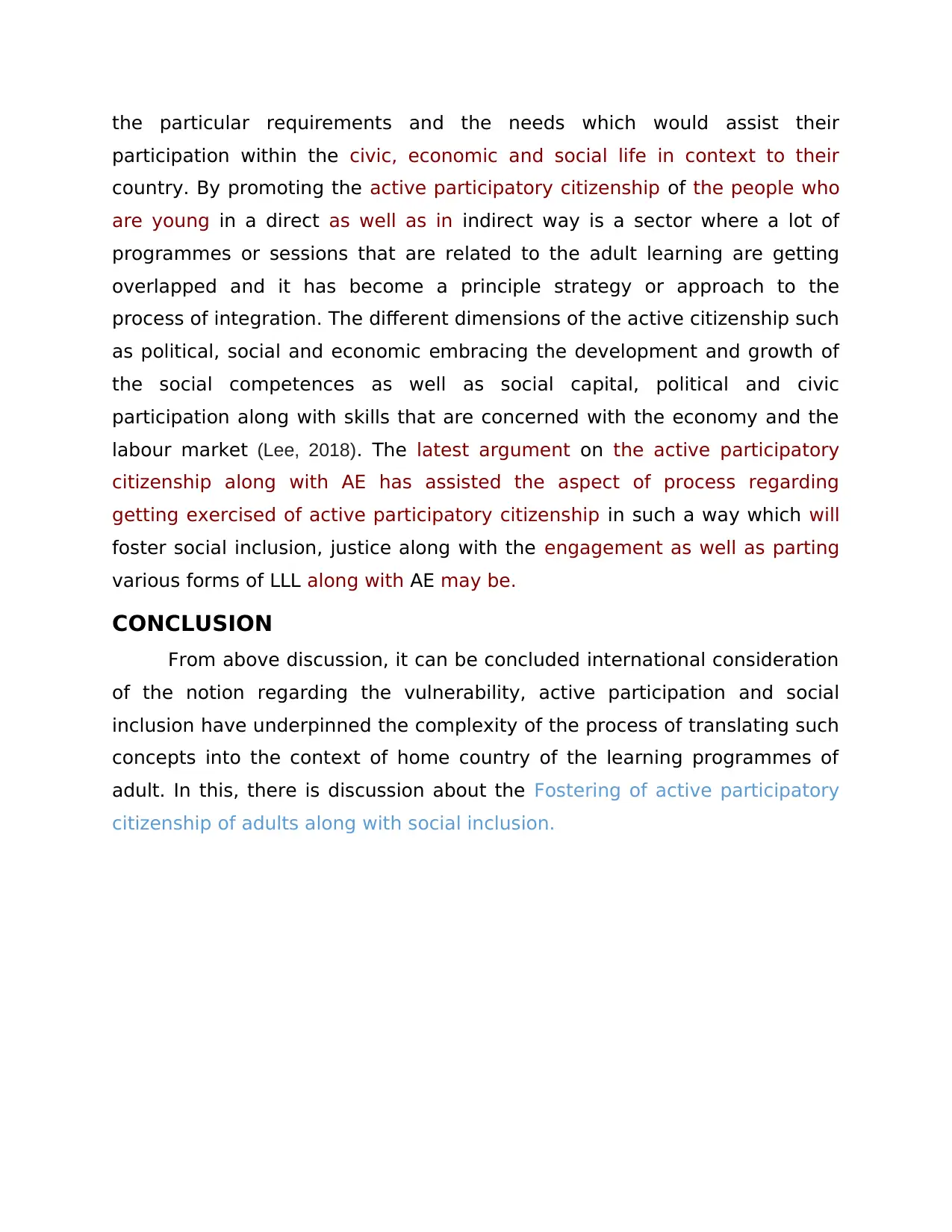
the particular requirements and the needs which would assist their
participation within the civic, economic and social life in context to their
country. By promoting the active participatory citizenship of the people who
are young in a direct as well as in indirect way is a sector where a lot of
programmes or sessions that are related to the adult learning are getting
overlapped and it has become a principle strategy or approach to the
process of integration. The different dimensions of the active citizenship such
as political, social and economic embracing the development and growth of
the social competences as well as social capital, political and civic
participation along with skills that are concerned with the economy and the
labour market (Lee, 2018). The latest argument on the active participatory
citizenship along with AE has assisted the aspect of process regarding
getting exercised of active participatory citizenship in such a way which will
foster social inclusion, justice along with the engagement as well as parting
various forms of LLL along with AE may be.
CONCLUSION
From above discussion, it can be concluded international consideration
of the notion regarding the vulnerability, active participation and social
inclusion have underpinned the complexity of the process of translating such
concepts into the context of home country of the learning programmes of
adult. In this, there is discussion about the Fostering of active participatory
citizenship of adults along with social inclusion.
participation within the civic, economic and social life in context to their
country. By promoting the active participatory citizenship of the people who
are young in a direct as well as in indirect way is a sector where a lot of
programmes or sessions that are related to the adult learning are getting
overlapped and it has become a principle strategy or approach to the
process of integration. The different dimensions of the active citizenship such
as political, social and economic embracing the development and growth of
the social competences as well as social capital, political and civic
participation along with skills that are concerned with the economy and the
labour market (Lee, 2018). The latest argument on the active participatory
citizenship along with AE has assisted the aspect of process regarding
getting exercised of active participatory citizenship in such a way which will
foster social inclusion, justice along with the engagement as well as parting
various forms of LLL along with AE may be.
CONCLUSION
From above discussion, it can be concluded international consideration
of the notion regarding the vulnerability, active participation and social
inclusion have underpinned the complexity of the process of translating such
concepts into the context of home country of the learning programmes of
adult. In this, there is discussion about the Fostering of active participatory
citizenship of adults along with social inclusion.
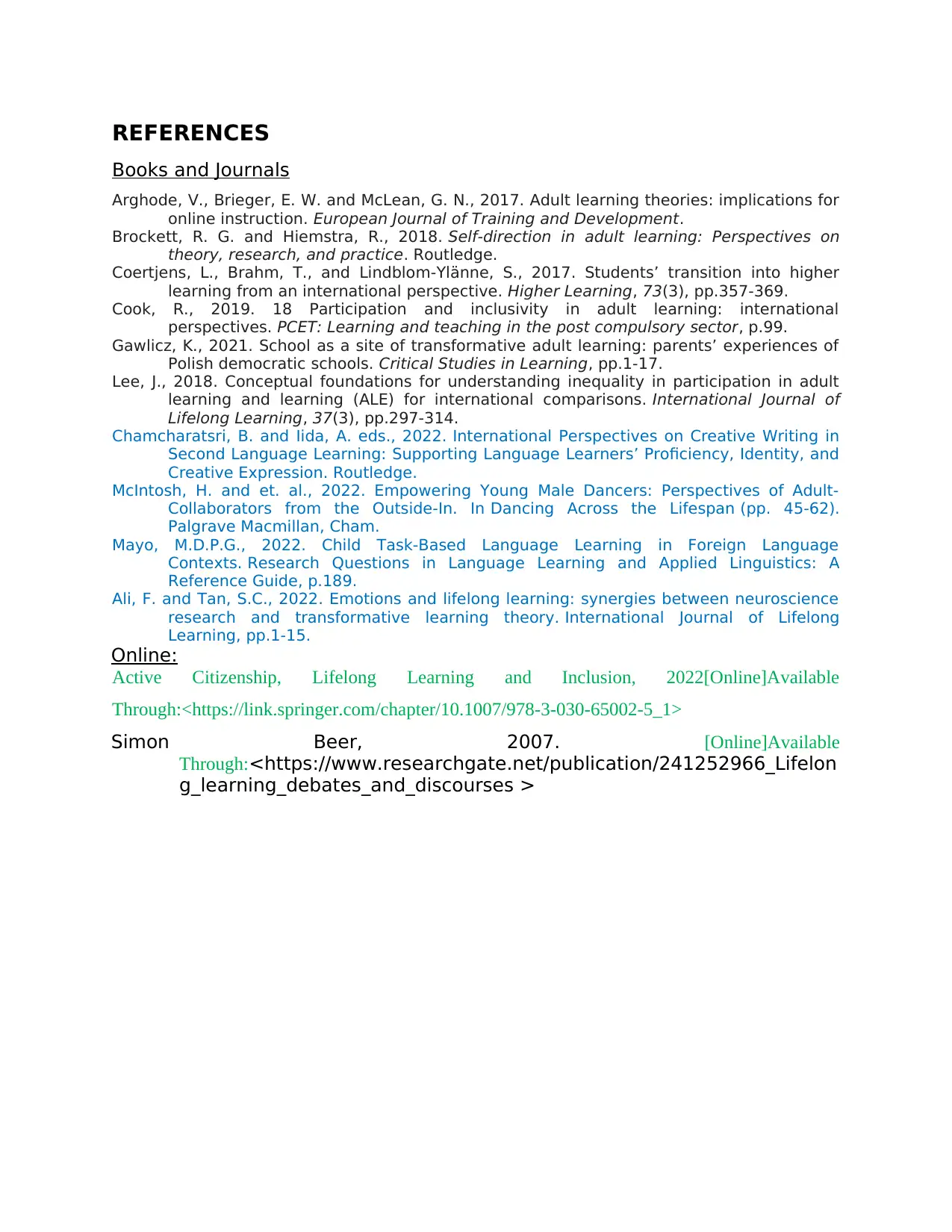
REFERENCES
Books and Journals
Arghode, V., Brieger, E. W. and McLean, G. N., 2017. Adult learning theories: implications for
online instruction. European Journal of Training and Development.
Brockett, R. G. and Hiemstra, R., 2018. Self-direction in adult learning: Perspectives on
theory, research, and practice. Routledge.
Coertjens, L., Brahm, T., and Lindblom-Ylänne, S., 2017. Students’ transition into higher
learning from an international perspective. Higher Learning, 73(3), pp.357-369.
Cook, R., 2019. 18 Participation and inclusivity in adult learning: international
perspectives. PCET: Learning and teaching in the post compulsory sector, p.99.
Gawlicz, K., 2021. School as a site of transformative adult learning: parents’ experiences of
Polish democratic schools. Critical Studies in Learning, pp.1-17.
Lee, J., 2018. Conceptual foundations for understanding inequality in participation in adult
learning and learning (ALE) for international comparisons. International Journal of
Lifelong Learning, 37(3), pp.297-314.
Chamcharatsri, B. and Iida, A. eds., 2022. International Perspectives on Creative Writing in
Second Language Learning: Supporting Language Learners’ Proficiency, Identity, and
Creative Expression. Routledge.
McIntosh, H. and et. al., 2022. Empowering Young Male Dancers: Perspectives of Adult-
Collaborators from the Outside-In. In Dancing Across the Lifespan (pp. 45-62).
Palgrave Macmillan, Cham.
Mayo, M.D.P.G., 2022. Child Task-Based Language Learning in Foreign Language
Contexts. Research Questions in Language Learning and Applied Linguistics: A
Reference Guide, p.189.
Ali, F. and Tan, S.C., 2022. Emotions and lifelong learning: synergies between neuroscience
research and transformative learning theory. International Journal of Lifelong
Learning, pp.1-15.
Online:
Active Citizenship, Lifelong Learning and Inclusion, 2022[Online]Available
Through:<https://link.springer.com/chapter/10.1007/978-3-030-65002-5_1>
Simon Beer, 2007. [Online]Available
Through:<https://www.researchgate.net/publication/241252966_Lifelon
g_learning_debates_and_discourses >
Books and Journals
Arghode, V., Brieger, E. W. and McLean, G. N., 2017. Adult learning theories: implications for
online instruction. European Journal of Training and Development.
Brockett, R. G. and Hiemstra, R., 2018. Self-direction in adult learning: Perspectives on
theory, research, and practice. Routledge.
Coertjens, L., Brahm, T., and Lindblom-Ylänne, S., 2017. Students’ transition into higher
learning from an international perspective. Higher Learning, 73(3), pp.357-369.
Cook, R., 2019. 18 Participation and inclusivity in adult learning: international
perspectives. PCET: Learning and teaching in the post compulsory sector, p.99.
Gawlicz, K., 2021. School as a site of transformative adult learning: parents’ experiences of
Polish democratic schools. Critical Studies in Learning, pp.1-17.
Lee, J., 2018. Conceptual foundations for understanding inequality in participation in adult
learning and learning (ALE) for international comparisons. International Journal of
Lifelong Learning, 37(3), pp.297-314.
Chamcharatsri, B. and Iida, A. eds., 2022. International Perspectives on Creative Writing in
Second Language Learning: Supporting Language Learners’ Proficiency, Identity, and
Creative Expression. Routledge.
McIntosh, H. and et. al., 2022. Empowering Young Male Dancers: Perspectives of Adult-
Collaborators from the Outside-In. In Dancing Across the Lifespan (pp. 45-62).
Palgrave Macmillan, Cham.
Mayo, M.D.P.G., 2022. Child Task-Based Language Learning in Foreign Language
Contexts. Research Questions in Language Learning and Applied Linguistics: A
Reference Guide, p.189.
Ali, F. and Tan, S.C., 2022. Emotions and lifelong learning: synergies between neuroscience
research and transformative learning theory. International Journal of Lifelong
Learning, pp.1-15.
Online:
Active Citizenship, Lifelong Learning and Inclusion, 2022[Online]Available
Through:<https://link.springer.com/chapter/10.1007/978-3-030-65002-5_1>
Simon Beer, 2007. [Online]Available
Through:<https://www.researchgate.net/publication/241252966_Lifelon
g_learning_debates_and_discourses >
⊘ This is a preview!⊘
Do you want full access?
Subscribe today to unlock all pages.

Trusted by 1+ million students worldwide
1 out of 6
Related Documents
Your All-in-One AI-Powered Toolkit for Academic Success.
+13062052269
info@desklib.com
Available 24*7 on WhatsApp / Email
![[object Object]](/_next/static/media/star-bottom.7253800d.svg)
Unlock your academic potential
Copyright © 2020–2025 A2Z Services. All Rights Reserved. Developed and managed by ZUCOL.





